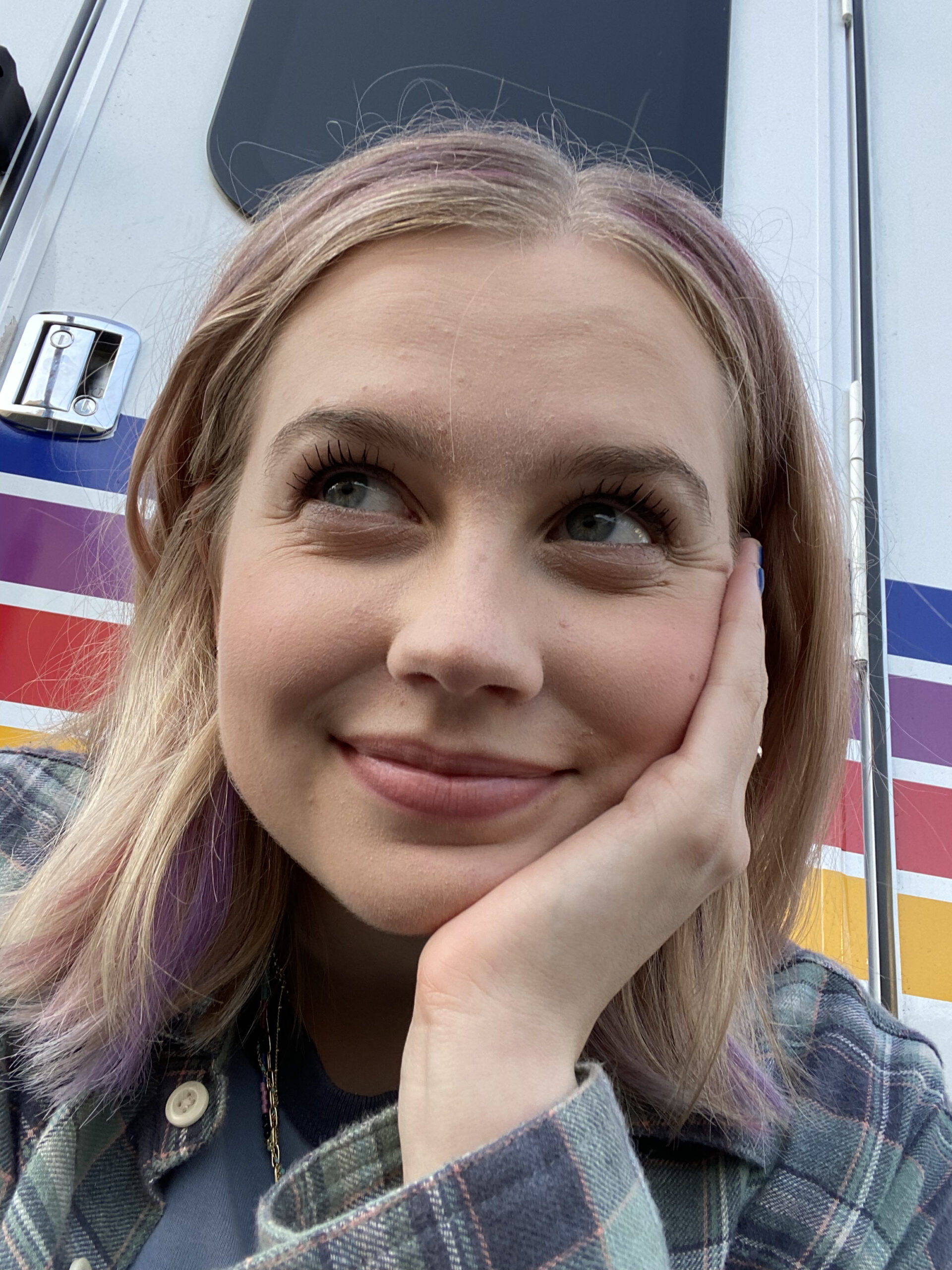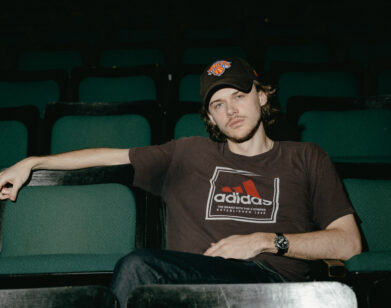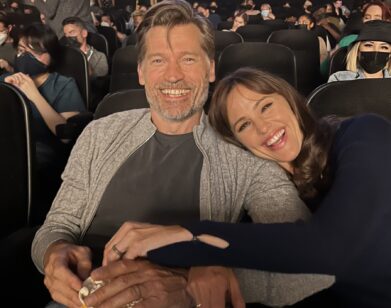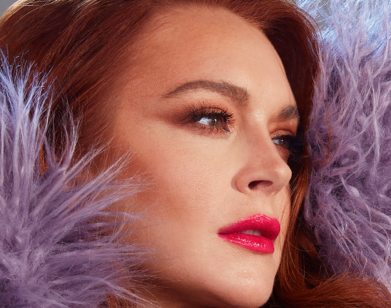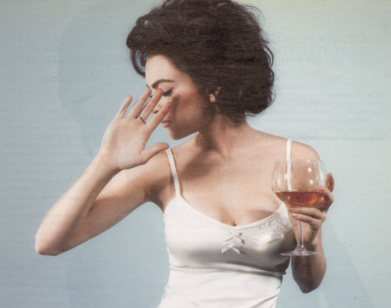IN CONVERSATION
Angourie Rice Tells Gaten Matarazzo About Her Acting Nightmares
It takes a certain je ne sais quoi to be cast in the remake of a cultural phenomenon like Mean Girls. Call it talent, versatility, or longevity, but at just 22 years old the Australian actor Angourie Rice definitely has it. Having started her career as a child actor, Rice is technically a veteran, sharing movie credits with the likes of Ryan Gosling, Rebel Wilson, and Zendaya (in the Spider-Man franchise). This eventually nabbed her a leading a role as Kate Winslet’s daughter in Mare of Easttown. Now, Rice finds herself exploring yet another fraught mother-daughter relationship in AppleTV+’s drama/thriller The Last Thing He Told Me, where she stars opposite Jennifer Garner. As Rice films the Mean Girls musical adaptation under Tina Fey’s direction, she found time in her busy schedule for a chat with her friend and Honor Society costar Gaten Matazzaro, who’s currently on Broadway in Sweeney Todd. Below, the two catch up about podcasting, the end of the world, and the oomph of a good musical number. – ERNESTO MACIAS
———
GATEN MATARAZZO: Hello!
ANGOURIE RICE: How you’re going, Gaten?
MATARAZZO: I’m so good. Oh, my gosh, I’m so prepared.
RICE: I saw your list of questions.
MATARAZZO: I’m going to disregard all of them and talk about Spider-Man for an hour. Is that okay with you?
RICE: I love that. What’s up? The last time I saw you was on stage.
MATARAZZO: It was on stage. I’m so glad that now we get to finally catch up. I’m going to make it all about me.
RICE: Thank you for doing this. Especially on a Sunday, when you are literally in a Broadway show.
MATARAZZO: We have just one today, so nothing crazy, and this is a great little warm-up. This is fun doing it over Zoom, though. It feels very 2020 of us.
RICE: I know, flashbacks.
MATARAZZO: Do you like auditioning in the context of post-COVID in comparison to what it was like before? Because there’s a lot less in-person.
RICE: Great segue, by the way. I can tell you worked on that.
MATARAZZO: Very much so.
RICE: Well, pre-pandemic I spent so much more time in Australia, and then post-pandemic, I’m spending more time in the U.S. When I was in Australia, all my auditions were on Zoom so it’s honestly kind of the same for me.
MATARAZZO: Is that good or bad?
RICE: I don’t mind a self-tape. I don’t mind a Zoom audition. I get so nervous in the room, that’s the thing.
MATARAZZO: Do you think that would reflect on a stage?
RICE: Absolutely. I’m terrified at the thought of doing theater, but that’s why I love it so much. I see these people performing live every single night and they don’t mess it up and give it everything.
MATARAZZO: Yeah, they do.
RICE: Well, yeah, but when I saw you, you didn’t mess anything up.
MATARAZZO: We could have. You never really know.
RICE: That’s true.
MATARAZZO: When did you film Mare of Easttown?
RICE: We were stopped by the pandemic. We had a new crew and we had some of the same crew and then everyone was like, “Hey, how are you?”
MATARAZZO: How long was the break?
RICE: We stopped in March and went back in September. The same with you for Stranger Things?
MATARAZZO: Exactly the same. Is there talk of another one?
RICE: I don’t know. I’m not the person to ask. I’d cut my hair again, but we’ll see.
MATARAZZO: I always thought of this during the pandemic, how weird it was that we weren’t doing what we loved. I’m sure that you missed it quite a lot.
RICE: Yeah, it was very strange.
MATARAZZO: Did you find hobbies? Did you find career backups?
RICE: I don’t know about career backups. I found hobbies. I started baking a lot and I started knitting.
MATARAZZO: What would you do, if everything went to shit forever?
RICE: In this world, does the movie industry still exist? Does theater exist? If there’s no performing arts, I would probably want to be a writer.
MATARAZZO: You’re good at it. You’d be great at that.
RICE: Thank you. What would you do?
MATARAZZO: It’s not my interview. It’s your interview. We’re talking about you, clearly.
RICE: Sorry.
MATARAZZO: Do you think that you have the drive to start writing?
RICE: Yeah, me and my mom have written a book together. It will be out in October in Australia and at a later date it will be out in the U.S. and the U.K.
MATARAZZO: Plug it. Plug it.
RICE: I’ll send you a copy.
MATARAZZO: You’re a big reader.
RICE: Yeah. So I just feel like I know that more than I know the structure of a film script.
MATARAZZO: I think with film scripts they want to give it to an actor and they want them to kind of establish that. But when you read fiction, you’re given that internal thought process by the author, which I think is really fun to read.
RICE: Yeah, very well-said. I like that about books. I also find reading scripts to be like reading a recipe.
MATARAZZO: Do you ever read source material before going to work or does it give you too much?
RICE: No, I pretty much always do, if something’s based on a book like The Last Thing He Told Me. They gave me the seven scripts and I read that first and then I read the book. And with that book, it’s interesting because I feel like the scripts add more to my character, Bailey, than the book does.
MATARAZZO: Oh, that’s great.
RICE: The book is so much from Hannah’s perspective, which is the character Jennifer Garner plays. It’s like from a first-person perspective, it’s about her.
MATARAZZO: How much time on set did you and Jennifer Garner have?
RICE: We had a lot of time together. I was always sad when I didn’t have scenes with her because I felt like we created such a shorthand and such an easy way of working. We would just fall into it. We would go through the scripts together and go through what had happened the day before we did the scene. That was really nice.
MATARAZZO: And Jen’s a pro, too. Just to be in her presence was probably very cool.
RICE: Absolutely. She had the book with her the entire time, she had underlined, doggy-eared. She would go up and say, “I love this line in the book. Is there a way we can fit that into the scene?”
MATARAZZO: I think collaboration is essential when adapting something because there’s always that fine line of do you want to create something new from this? I think nowadays when you adapt from source material you’re not limited to a two-hour movie. You have all the time in the world pretty much. I guess it’s similar to other work you’ve done, like with Spider-Man.
RICE: Everyone knows that character and that world. So it’s interesting adapting it with a new cast and with a new backdrop of the Avengers and all of that. And the other thing is that Laura Dave, who wrote the book, co-created the show with her husband, Josh Singer, who’s a writer. He was our showrunner.
MATARAZZO: That’s always great.
RICE: It was amazing. You never felt like, “Oh, how would the author feel about this?”
MATARAZZO: She was on set the whole time?
RICE: She was hanging out. No question was too small for her.
MATARAZZO: Do you have any more episodes or seasons of your podcast?
RICE: It’s coming. It’s coming.
MATARAZZO: I’m sorry if I stressed you out with that question.
RICE: No! It’s coming, guys. It’s coming. I hate to be that person, “My schedule is so crazy.” But it is!
MATARAZZO: I can imagine so.
RICE: It is. That’s why we’re doing this on a Sunday.
MATARAZZO: Sure. Do you guys have weekends off over at…
RICE: Mean Girls Musical.
MATARAZZO: There it is.
RICE: This week we did work Saturday. We worked yesterday, which is why I slept through my alarm this morning and had 15 minutes to get ready. And it’s been three days and I still haven’t found my hairbrush.
MATARAZZO: No–
RICE: Which is why this is happening.
MATARAZZO: It’s a moment.
RICE: Thank you. So where was I going with this? Once this wraps, which has been so exciting and fun and amazing and busy, I will have a little bit of time to go back to my little computer in my little bookworm cave hole and write some more episodes.
MATARAZZO: This is not in relation to anything we were just talking about. I’m just purely curious. What is filming a musical number like?
RICE: It’s crazy.
MATARAZZO: That idea scares the crap out of me.
RICE: But see, the idea of doing a musical number live on stage scares the crap out of me. This is something we talked about after Sweeney Todd. Like, the thing about filming a musical number is you get so many tries to get it right.
MATARAZZO: Of course. I think the one difference to me is that when people go to a theater, I think even though people know they’re going to see a musical, there’s still a reluctance with audiences to suspend disbelief enough to be okay with seeing that medium transform on a screen. You know what I mean? On a stage, because realism is kind of very abstract, people are very much willing to be okay with the narrative being driven through song. I’ve never understood that.
RICE: I have to tell you because I saw Sweeney Todd with a few of the girls from Mean Girls we were all singing Sweeney Todd on set the next day. I would just go up to them and go “Sweeney! Sweeney Todd!” One of the girls has a Sweeney Todd tote bag that she brings to set every day.
MATARAZZO: The one from the merch stand?
RICE: Yes. The one from the merch stand. She loves it.
MATARAZZO: Oh, good. Do you ever get anxious when you’re not working?
RICE: Well, I’m anxious when I’m not working and I’m anxious when I am working. But that’s something I’m looking into. I do feel like I always need to be doing something. I always like to have a to-do list. I love the call sheet. I study that. I love to know what time everyone’s getting picked up. I want to know what time everyone is getting in the hair and makeup chair. I love all that. So when I’m not working, I make to-do lists for myself, even if it’s stupid stuff, like “Eat breakfast.”
MATARAZZO: That’s not stupid.
RICE: “Get dressed.” I think that helps me feel like I’m doing something. When I’m not doing the thing that I want to be doing, then checking things off a list is good.
MATARAZZO: That’s why I think you’d love theater, because that’s so schedule oriented. Would you say that you thrive on a schedule, for the most part?
RICE: I do. I love it when we get a new schedule. I’m waiting for the pink one-liner to come out.
MATARAZZO: You know exactly what the hell you’re going to be doing on any given day—when you’re going to be there, when your day is going to end. I think that’s great, but you do have a lot of downtime.
RICE: Yeah. I feel like because you film a movie in bits and pieces, you never really get to relax until it’s over.
MATARAZZO: I agree. I think even with scene partners as well, it’s really hard to feel relaxed when you are tackling something for the first time. I think it’s hard to build chemistry with people unless you have a good amount of time to study, learn, create a background and a rapport. I think that was great with Honor Society, though, I’ve never had rehearsals for a movie.
RICE: I’d done a few things where they’d done rehearsals before going into it, which is always so good if you can get the time. I remember that day as well because it was my sister’s birthday.
MATARAZZO: Yes, of course it was. That’s right.
RICE: Well, we had rehearsals for The Last Thing You Told Me as well. Less rehearsals, more like read-throughs. It was me, Jennifer Garner, Josh Singer, and Laura Dave. [We] would sit down together with strawberries, donuts, and coffee and we would read the scripts out loud, and then after that, we’d talk about them and discuss the bits we wanted to draw out or highlight.
MATARAZZO: Do you think your chemistry with Jen, there was a need to interact away from the set and of a rehearsal context to find that relationship?
RICE: Well, I think Jen is so good at making people feel comfortable. Between takes and setups, we would be chatting about life, the scene, about whatever. Once you have that baseline of, “Oh, you are cool, we’re cool, this is great,” then you can explore the scary stuff. I think it was about building trust, which I really felt that we did.
MATARAZZO: In any context, that’s important. In any line of work with anybody you’re working with, that’s square one.
RICE: Yeah.
MATARAZZO: Do you think it’s the same process with characters that you are very distant from?
RICE: I do. When I think about working on Mare of Easttown and playing Siobhan and how she had such a difficult and strange relationship with her mother, I think actors need to feel safe in order to explore. I think there are some actors who love to feel out of their comfort zone and love to feel pushed, and that’s what makes them find it. But for me, if the environment around me feels safe and comfortable, that’s when I can really go for it because I have that knowledge that it will be okay. Can I ask you a question?
MATARAZZO: You might be crossing the line here. But I’ll allow it.
RICE: What is your favorite thing about performing live on stage every night?
MATARAZZO: Oh, that’s a big one, for sure. I think the love, the real love and drive to keep going back, what’s the word? Oomph?
RICE: Oomph!
MATARAZZO: I think all of it is backstage, fully. I think the love and drive really come from the environment that’s around me. Because everybody who’s there loves what they’re doing. Everybody there loves to act and loves to tell stories and feel like they get to be other people. I just know that I’ve gravitated towards it for a long time and I think you’d be very good at it. Have you read plays?
RICE: Yeah, I have. Both my parents work in theater, so I grew up watching a lot of theater and I continued to watch theater. I recently did a play reading for a play that my mom wrote, which was really fun.
MATARAZZO: That also is so interesting to me, that your parents were both so involved in the theater.
RICE: Well, when I was a kid I was like, “Mm, I don’t want to do theater. I want to do film, I want to be different.” But it’s still in my bones.
MATARAZZO: I’ve been asking a lot of people this. What is your recurring actor’s nightmare? And is it specific to you?
RICE: Yes and yes. My recurring nightmares are always about acting. It’s so interesting you bring this up because every time I’m working on a production so intensely, I always dream about set, and everyone on set is in my dream. It happened in Honor Society too. I would dream that I would get to set and not know any of my lines. The only real job you have as an actor, the only thing you need to prepare for the day, is to know your lines.
MATARAZZO: What’s on the page.
RICE: So my fear and my recurring nightmare is going to set and then I can’t get it. No matter how many times I try, I cannot get it.
MATARAZZO: The fear that you’ll just forget how to do what you’ve been doing for a decade.
RICE: Yeah. Another recurring one actually has to do with the theater and I’m the understudy and they’re like, “We need you on stage.” But I’m always a very under-prepared understudy.
MATARAZZO: Do you ever write your dreams down?
RICE: No, because I read that if you write down your dreams, you will remember them more frequently. You’ll get into a habit of remembering them. And I don’t want that.
MATARAZZO: I think they’re fun. I think they’re a cool little insight into the things you forget about yourself.
RICE: Yeah, that’s true.
MATARAZZO: I have a whole log in my notes of all my weird dreams, but I don’t remember them very often. So that’s why when I do I’m like, “Oh, that’s special.”
RICE: Someone would pay a lot of money to read that, I bet.


